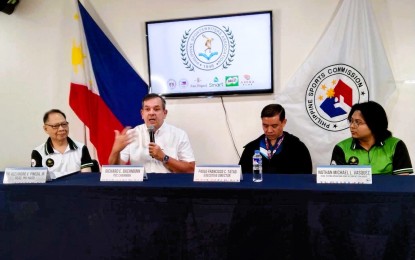
ANTI-DOPING PROGRAM. Philippine Sports Commission Chairman Richard Bachmann (2nd from left) talks about the country's anti-doping program during the Philippine Sportswriters Association (PSA) Forum at the Rizal Memorial Sports Complex on Tuesday (March 26, 2024). Also in photo are (from left) Philippine National Anti-Doping Organization (PHl-NADO) chief Dr. Alex Pineda, PSC Executive Director Paulo Tatad, and PHl-NADO testing operations head Nathan Vasquez. (Contributed photo)
MANILA – The Philippine Sports Commission (PSC) wants the Philippine National Anti-Doping Organization (PHI-NADO) to become fully an independent body that will cater to national athletes.
PSC Chairman Richard Bachmann cited Malacanang’s “total support” in the bid to form an independent PHI-NADO serving the national athletes and to be fully compliant with the World Anti-Doping Code, and with the support from the Senate and Lower House members.
The Philippines, which was removed from the compliance watch list of the World Anti-Doping Agency (WADA) last week, has to strengthen its anti-doping program and continue to educate athletes and coaches from various national sports associations (NSAs).
“Given the progression of the anti-doping world, a lot of countries have independent anti-doping agencies. This is the proper time we have one in PHI-NADO,” PSC executive director Paulo Tatad said during the Philippine Sportswriters Association (PSA) forum at the Rizal Memorial Sports Complex on Tuesday.
“We are making sure we do the necessary steps. Our friends in Malaysia, Indonesia, Thailand gave a lot of insights. And given all of that, we are in the right direction,” he added.
Bachmann, PHI-NADO chief Dr. Alex Pineda and testing operations head Nathan Vasquez joined Tatad in the weekly session presented by San Miguel Corporation, Philippine Sports Commission, Philippine Olympic Committee, MILO, PLDT/Smart, and ArenaPlus, the 24/7 sports app in the country.
“The threat that came with WADA non-compliance meant that starting last Feb. 22, we would not have been allowed to host international sporting events like FIBA qualifiers (among others) and that if a Filipino wins in international competitions, the Philippine flag cannot fly. Of course, (it affects) our national pride,” Pineda said.
He said settling the non-compliance issue “is just the first step,” and more actions must be taken.
“We are being monitored by WADA not on testing alone but on anti-doping education as well, capacity building, management of results and data privacy,” Pineda said. “We need to work with PSC, the POC (Philippine Olympic Committee), and the NSAs. Collaboration is needed."
The PHI-NADO has to regularly communicate with athletes, reminding them of their responsibilities with regards to anti-doping.
“The job is not yet done. It has a lot to do with testing, education and other aspects of doping,” Vasquez said. (PNA)
